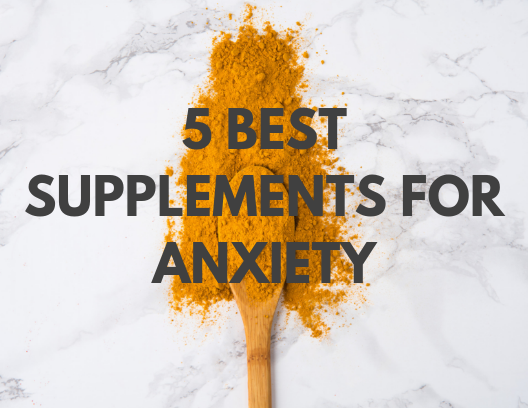Two things we know a lot about here at SSW: supplements and anxiety. Finally, it’s time to combine the two into one epic blog post. Anxiety is a monster that needs to be managed, so in this case the supplements are… the manager? The assistant manager? Okay, that makes their job sound way less cool than it is.
What’s great about adding supplements to your wellness routine is that it is a preventative way to support your mental health. This could result in less anxiety and panic attacks over time.
Keep reading because in this article we are going to let you know, with the most updated information possible, what the best supplements for anxiety are.

B-Vitamins
B-vitamins are really important for both energy production and supporting the central nervous system on a cellular level (1). Supporting brain function of course in turn supports one’s ability to deal with stress, think clearly, and problem solve, thereby aiding in ones ability to deal with anxiety. However it doesn’t just stop there – studies have actually been shown that supplementing b-vitamins is helpful in improving mood. Vitamin B1 (thiamine) has been used to treat patients with anxiety with promising results (2). That being said, b-vitamins compete for absorption so it’s best to take a good quality complex in which all b-vitamins can be taken and absorbed.

Adaptogens
We’ve talked about adaptogens and anxiety here before, so naturally it’s made the list for the 5 best supplements for anxiety. Adaptogens are substances which help to regulate cortisol – common examples are maca, ashwagandha, and matcha (3). Balancing cortisol is important for keeping stress under control, thereby aiding in ones ability to deal with anxiety.
The bonus here is that many adaptogenic substances also have a host of other benefits. Some are great anti-inflammatories, while others are useful in boosting energy (3). Talk to a professional if you are unsure which one will be right for you. Most adaptogens are sold in pill and powder form. The powder forms are easily mixed into elixirs and smoothies.

Vitamin D
Vitamin D is something that our bodies are able to synthesize in sunlight. But if you’re confined to the indoors for most of the day, or you happen to live in a climate that doesn’t get very much sun, you might want to look into supplementing with vitamin D, because over time these particular situations could lead to a vitamin D deficiency.
Vitamin D is important in maintaining the health of the immune, cardiovascular, brain, and nervous systems (4). Because vitamin D is so vital to brain health, it makes sense that a deficiency could lead to mood instability. Various studies have been done on both animal and human subjects supporting that supplementing with vitamin D can lead to decreased levels of anxiety (5,6,7).
Always buy a vitamin D supplement that is suspended in oil (liquid or capsule), as vitamin D is fat soluble.

Probiotics
The biggest revelation in mental health recently has been the impact that your gut can have on your mood. That’s right: gut health and mental health are linked much more than ever previously thought (8). This is where probiotics come in, as probiotics are helpful in cultivating proper gut health.
Probiotics contain healthy bacteria needed by the gut to function optimally. Gut health can be compromised when the bad bacteria out weighs the good. Compromising your gut health could result in having compromised mental health (9). Although this area of research is relatively new, the positive effects of probiotics towards minimizing anxiety are promising (10). Probiotics are sold in capsule form and should be stored in the refrigerator for longevity. Most health food stores will also keep their probiotic stock in a fridge.

Magnesium
Magnesium is one of the most important minerals for the body. It is a cofactor in hundreds of different processes in the body. One thing that makes it really valuable in terms of anxiety is it’s capacity to help with muscle relaxation. It is also important in the role it plays regulating the HPA-axis. A deficiency in magnesium does have a relationship with increased anxiety (11).
Sufficient levels of magnesium has been shown to result in stabilized anxiety symptoms in multiple trials (12). The unfortunate part is that dietary intake of magnesium is typically poor in western culture. That’s where supplements come in. Because calcium and magnesium often work together in the body, they are often sold together in supplement form. You can find them in pill and also powder forms.
There are all kinds of avenues to explore when it comes to treating your anxiety, and supplementation is one avenue worth delving into. Not only is the science there to support it, but it also adds another aspect to a well-rounded mental-health wellness routine.
Are you using any supplements to support your mental health? We love hearing your two cents in the comments.

Disclaimer: I am not a doctor, naturopath, or pharmacist. As a CHNC I am only qualified to work with food. Even though these supplements have been scientifically backed by research for use, you should take these suggestions to your health professional before adding them to your wellness routine.
References
- https://www.ncbi.nlm.nih.gov/pmc/articles/PMC4772032/
- https://www.ncbi.nlm.nih.gov/pmc/articles/PMC3046018/
- https://www.ncbi.nlm.nih.gov/pmc/articles/PMC3991026/
- https://www.medicalnewstoday.com/articles/161618.php
- https://www.tandfonline.com/doi/full/10.1080/19390211.2017.1334736
- http://citeseerx.ist.psu.edu/viewdoc/download?doi=10.1.1.721.8885&rep=rep1&type=pdf
- https://www.ncbi.nlm.nih.gov/pubmed/29082262
- https://www.ncbi.nlm.nih.gov/pubmed/27793225
- https://www.ncbi.nlm.nih.gov/pubmed/30026389
- https://www.ncbi.nlm.nih.gov/pubmed/25470391
- https://www.sciencedirect.com/science/article/pii/S0028390811003054
- https://www.ncbi.nlm.nih.gov/pmc/articles/PMC5452159/

Leave a comment